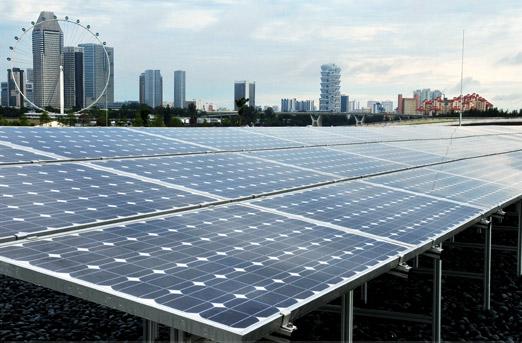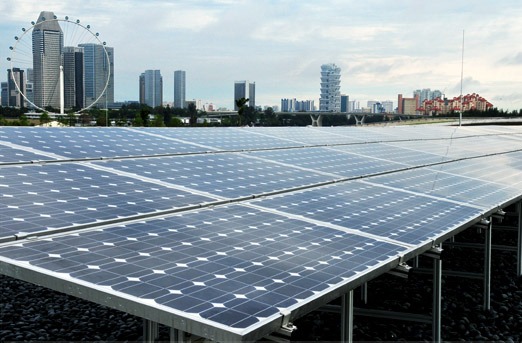The ambitious Microsoft is on its way to becoming the biggest distributed solar company in Singapore.
And why not? As it turns out, this is even safer than developing a utility-scale project, as noted by Brian Janous, Microsoft’s general manager of energy. The tech giant announced earlier this month that it would be procuring 60 megawatts of solar power in Singapore.
Why distributed solar?
During an interview with The Interchange podcast this month, Janous told GTM that their strategy to acquire the 60MW from rooftop solar was not as risky as sourcing the whole capacity from a single plant.
“There is a small amount of volume risk,” he said. “But what you don’t have is the risk that the entire project doesn’t get developed. We’ve had other projects that have had challenges related to permitting issues that may put in jeopardy 100 percent of the output.”
“With this one, because it is distributed, in some ways you reduce that development risk. You might have slightly more uncertainty — is it going to be 60 megawatts or 58 megawatts? But you’re distributing some of that exposure you have in traditional development projects,” said Janous.
Microsoft and Sunseap Group partnership
While speaking to the Interchange, Janous also mentioned Microsoft’s outlook at energy battery storage and directly combining renewables with localized demand at various facilities across the globe.
The procurement agreement between Microsoft and Sunseap Group, a solar PV developer in Singapore, will be the company’s first clean energy deal in Asia and will be the largest ever distributed solar PV panel portfolio in Singapore, Microsoft further stated.
According to the tech guru, the project’s build-out will feature “hundreds of rooftops across the nation,” is poised to be the first ever rooftop distributed solar portfolio in Singapore, and is tailored to serve data center energy usage.
“Our cloud services are helping to power Singapore’s digital transformation, and today’s agreement will ensure that transformation is increasingly powered by clean energy,” said Kevin Wo, Microsoft Singapore’s managing director, in a recent press release.
Microsoft which boasts over 850 employees in Singapore will not be the sole owner of the solar plants, according to Janous. Rather, it will acquire 100 per cent of the energy generated by distributed solar plants set up, operated and owned by Sunseap for a period of 20 years.
Renewable-powered data centers
Microsoft was compelled to consider distributed solar generation since there was inadequate space to initiate utility-scale projects, Janous added. “We were really limited to just looking at what is available, and in Singapore it’s rooftops,” he commented. “That was the only clear route we had to get to a material amount of energy.”
The other impediment was the need for more space besides that available on its own buildings. The company’s data centers in Singapore are almost the size of a Walmart Supercenter, stated Janous, yet Microsoft was “consuming 10 to 20 times the amount of electricity.”
The energy capacity produced from the rooftop of Microsoft’s Singapore data center can only serve adjacent offices, he added. The company’s data centers in Singapore deliver various cloud services for customers including Microsoft Azure and Office 365.
The Singapore deal will be Microsoft’s third global clean energy announcement, after the 2017 wind deals announcements in Ireland and the Netherlands. The company has long been a driving force towards renewables in the technology industry.
Once it becomes operational, the Singapore solar energy project will see Microsoft’s overall direct global procurement in renewables projects grow to 860 megawatts, noted Christian Belady, Microsoft’s general manager for cloud infrastructure strategy and architecture.
With this new deal, Microsoft will be well on track to comfortably power 50 per cent of its worldwide data center load with renewables throughout the year, Belady said.
The new contract is also a huge coup for Sunseap Company, which earlier this year signed a 21-year power purchase agreement for generating 4 megawatts with PSA, a port operator. The company owns a portfolio of assets including the 140MW solar farm based in India and a 10MW PV project in Cambodia.



